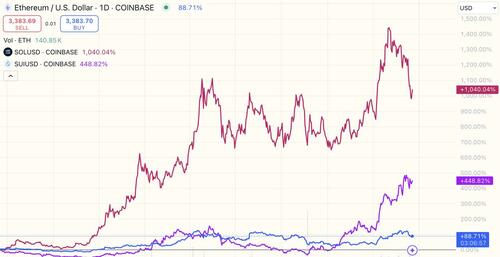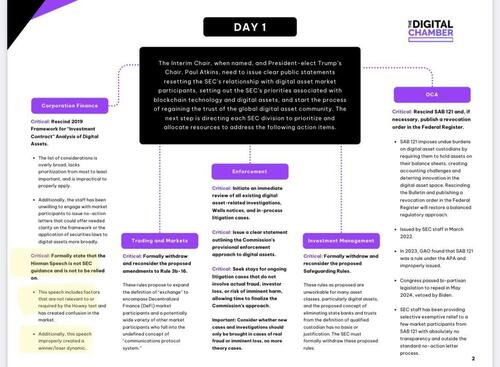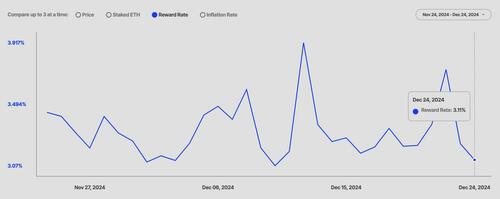
MEGA ’25: How Trump Can Make Ethereum Great Again In 2025
Authored by Tom Mitchelhill via CoinTelegraph.com,
Ethereum’s Ether has been marred by under-performance over the last 18 months, seeing Bitcoin and a swathe of other alternative layer-1 coins, including the likes of Solana and Sui, dramatically outperforming it.

While ETH has gained 88% in the last 18 months, SOL has posted a 1,040% gain, and SUI has rallied 448% in the same timeframe.
“ETH got sandwiched in 2024 between two shiny objects: Bitcoin, which attracted a huge amount of institutional interest, and Solana, which gained traction with retail investors. ETH was the odd man out,” Bitwise chief investment officer Matt Hougan told Cointelegraph.
However, many crypto pundits believe the election of Donald Trump in the United States and the expected crypto-friendly stance of key agencies under his new administration could mark the turning point for the performance of Ether in the crypto market. After all, the incoming president’s family launched its own decentralized finance (DeFi) project, World Liberty Financial, on the chain.
Experts are looking at a swathe of new developments for a bullish stance on ETH heading into 2025, ranging from the demise of “financial nihilism” to a complete overhaul of the US Securities and Exchange Commission, positive regulatory developments, Ether exchange-traded fund (ETF) staking, and increased Commodity Futures Trading Commission (CFTC) oversight of crypto.

Alternative layer-1 coins like SOL and SUI have drastically outperformed ETH. Source: TradingView
“Ethereum is poised to benefit more [from a Trump win] than other protocols, especially since it’s just a lot bigger and more mature than all the other ecosystems other than Bitcoin, which is mature but narrow in its purview,” Consensys CEO Joe Lubin told Cointelegraph at Devcon 2024.
At the same time, the gloss has started to come off Solana, whose SOL token peaked at an all-time high of $264 a month ago but has since retreated to $192 amid concerns over looming token unlocks.
End of crypto’s financial nihilism
One of the big factors weighing heavily on Ethereum’s price has been the aggressive approach of regulators toward alleged securities violations by ecosystem projects including Uniswap, Consensys, Lido and Rocket Pool. Memecoin projects, meanwhile, have been largely overlooked by the SEC.
A related issue is the disillusionment of crypto natives who were dumped on by venture capitalists during the brutal bear market. Many have turned to fair-launch memecoins and other hyper-speculative assets with little utility. Ikigai Asset Management founder and chief investment officer Travis Kling calls this phenomenon “financial nihilism.”
In a March 12 essay, Kling said financial nihilism gives little if any importance to “fundamentals” or any notion of an underlying “value proposition.”
“Financial Nihilism goes hand in hand with Populism – a political approach that strives to appeal to ordinary people who feel that their concerns are disregarded by established elite groups.”
“The underlying drivers of Financial Nihilism and Populism are the same – this system is not working for me, so I want to try something very different (e.g., buy SHIB or vote for Trump),” wrote Kling.
However, Ethereum is sold almost entirely on its fundamentals and utility. Advocates repeatedly make the claim that the blockchain network and its ecosystem of layer 2s stand as the future of legitimate, programmable digital money, smart contracts and decentralized financial activity.
Trump’s SEC overhaul is good for DeFi
Saul Rejwan, managing partner of crypto venture capital firm Masterkey, says Trump’s pro-crypto stance could see financial nihilism fall out of favor as legitimate projects are encouraged by regulators rather than hit with endless Wells notices from the SEC.
On Dec. 4, Trump tapped pro-crypto businessman and former SEC Commissioner Paul Atkins as his nominee for the next SEC chair, with current Chair Gary Gensler set to resign from the agency on Jan. 20.
The SEC will be losing three of its Democratic commissioners under Trump, with Jaime Lizarraga set to leave the agency on Jan. 17 and, more recently, the Senate Banking Committee canceling the renomination vote of crypto-skeptic commissioner Caroline Crenshaw on Dec. 17.
As the ruling party, the Republicans would typically appoint a majority of three commissioners, but the rapid-fire resignations and cancellations open the SEC up to a possible line-up of four Republican-appointed, crypto-friendly commissioners if Trump breaks protocol.
Rejwan told Cointelegraph that legitimate sectors of the crypto industry, specifically DeFi and decentralized physical infrastructure (DePIN), stand to benefit most from the new administration and a more crypto-friendly SEC.
“DeFi projects will thrive under a more favorable regulatory environment. Sectors like restaking just need a little regulatory push to hook institutional investors,” he said.
“We expect this new leadership to lower barriers to entry and make it easier for early-stage crypto entrepreneurs and resilient firms to innovate and thrive.”
The Gensler-led SEC under the Biden administration has been famously hostile to DeFi, with the regulator bringing Uniswap, the largest decentralized exchange on Ethereum, into its sights earlier this year.
The SEC has proposed expanding the definition of what qualifies as an exchange in the Exchange Act of 1934, explicitly arguing it should include crypto market participants in DeFi.
Anoop Nannra, CEO of Trugard Labs, said he expects the SEC to undergo a complete overhaul of its enforcement actions and policy directions, saying crypto assets are slated to be classified as “property” under the new administration.
“I’ve heard from several people within Trump’s orbit that property rights are a critical issue for this administration and that this is actually going to be the calling card for the Republican party’s position on crypto,” he said.
“I expect to see a complete revamp of the SEC’s position based on this.”
On Dec. 19, the Token Alliance — which incoming SEC Chair Paul Atkins was co-chair of — met with staffers for SEC Commissioners Hester Peirce and Mark Uyeda and issued its list of priorities. It requested that the agency denounce the controversial 2018 “Hinman speech” and formally withdraw a series of rules that deemed DeFi players to be seen as “exchanges” by law.

The Token Alliance has asked the SEC to walk back a swathe of anti-crypto policies. Source: The Digital Chamber
Nannra said he also expects the CFTC will soften to digital assets as well and that the SEC will engage in more discussions with the CFTC moving forward.
“I expect to see the CFTC take a more progressive position on crypto as well, further re-aligning the oversight powers between the SEC and the CFTC,” Nannra said.
SEC vs. CFTC: Does FIT21 even matter?
Many pundits believe that the Financial Innovation and Technology for the 21st Century Act (FIT21) — a bill that was passed through the House in May — would be central to the alignment of the CFTC and the SEC on crypto.
In short, the bill sought to introduce a federal framework for crypto regulation, pull back some of the SEC’s authority over digital assets, and hand over regulation of spot crypto markets to the CFTC instead.
Because Ether has also been deemed a commodity by the CFTC, several pundits have previously asserted that FIT21 could be highly beneficial for Ethereum from a policy perspective.
But now, with the change in the regulatory landscape, it raises the question of whether or not the FIT21 bill would be necessary or even desirable anymore. The bill may end up becoming just an unnecessary policy bargain made during a hostile time for crypto assets.
In a Nov. 15 client alert, lawyers from legal firm Brownstein noted the bill had stalled but would likely “serve as the starting point for legislative efforts in the new Congress.”
Regardless of whether FIT21 passes, Trump is reportedly considering handing the CFTC oversight over crypto during his upcoming term, which would also classify most crypto projects as commodities if they meet certain criteria.
If the CFTC is given regulatory control of crypto, it could come as a win for the industry, which has long signaled that the agency would be its preferred regulator — with the CFTC widely seen as having a “lighter touch” on regulation.
What legal changes can we expect to see under Trump?
Crypto lawyer Robert Nupp told Cointelegraph that the launch of the Trump dynasty’s World Liberty Financial was one the biggest “soft” endorsements of Ethereum, DeFi and real-world crypto projects. It has already purchased millions of dollars worth of ETH, Chainlink LINK$22.18 and Aave AAVE$326.14.
Nupp believes many within crypto are actually underestimating the positive impact of Trump on the industry.
“Right out of the gate, they’re going to be extremely helpful to crypto.”

Source: Lookonchain
According to Nupp, Trump is using World Liberty Financial as a beacon to show the world exactly how he intends to deal with crypto when he becomes president.
“He’s basically signaling to the world that it’s okay to do this going forward in his administration,” he said.
Nupp also tipped the Trump administration to move extremely quickly on crypto, pointing out Trump’s close ties with Elon Musk and the appointment of David Sacks as crypto and AI czar as evidence of the pace he will set.
“It’s going to be a blitzkrieg.”
ETH staking yields could come to ETFs
SEC Commissioner Peirce has already flagged the potential of revisiting decisions to block in-kind redemptions for crypto ETFs and to add staking for the Ether ETFs.
“If it changes from a majority of commissioners who don’t want things to go through to a majority of commissioners who do want things to go through, then yeah, it’s easier,” she said.
The ETF issuers — including Fidelity, 21Shares, and Franklin Templeton — have all requested the addition of staking, which currently yields approximately 3.1% per year, according to Staking Rewards.
“We believe, under a new Trump 2.0 crypto-friendly SEC, ETH staking yield will likely be approved,” Bernstein said, predicting that growing network activity on Ethereum could see rewards “juice up” to 4%–5%.

Ethereum boasts a 3.11% staking reward rate as of Dec. 24. Source: Staking Rewards
It doesn’t take much to connect the dots on why an ETF offering native yield would be bullish for the underlying asset, particularly in an economic landscape where the US Federal Reserve is looking to drop interest rates further in 2025.
“In a declining rate environment, ETH yield can be quite attractive. The yield feature in ETFs would also leave some spread for asset managers,” Bernstein said, adding that this would improve ETH’s economics and introduce further incentives to push ETH ETFs to institutional investors.
Tyler Durden
Fri, 12/27/2024 – 15:20

 8 miesięcy temu
8 miesięcy temu












